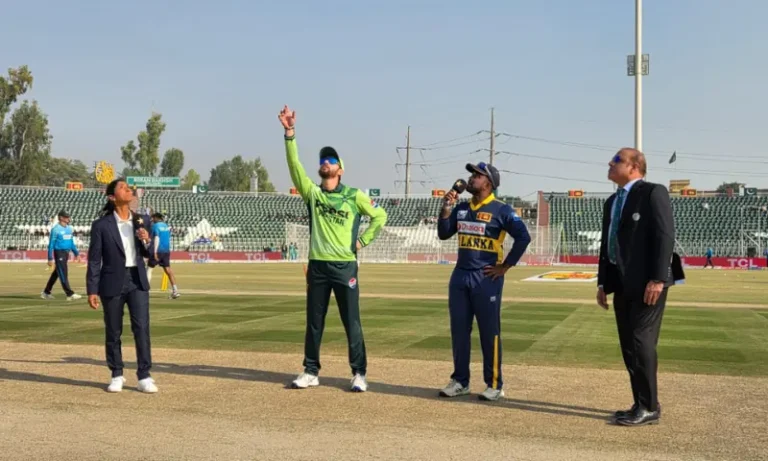Pakistan entered the second One-day International in Rawalpindi with a changed line-up and renewed focus, as captain Shaheen Shah Afridi was ruled out due to flu. Stand-in skipper Salman Ali Agha confirmed at the toss that Pakistan had opted to bowl first, adding that fast bowler Mohammad Wasim Junior would replace Shaheen, while spinner Abrar Ahmed had returned to the XI in place of all-rounder Faheem Ashraf.
Also Read: Pakistan and Sri Lanka Refocus on Cricket After Security Scare Ahead of Second ODI in Rawalpindi
The adjustments marked the beginning of a long-awaited shift back to cricket after nearly two days of off-field turbulence. The match, originally scheduled for Thursday, had been thrown into uncertainty following a terror attack in Islamabad on Tuesday, which raised immediate concerns within the Sri Lankan camp. What followed was a tense 48-hour period that overshadowed the sporting narrative and placed the continuation of the tour in doubt.
Reports quickly emerged suggesting several Sri Lankan players were contemplating leaving Pakistan altogether, leaving series officials scrambling to address their concerns. The gravity of the situation prompted swift intervention from Pakistan’s interior minister and PCB chairman Mohsin Naqvi, who met with senior security officials and the Sri Lankan delegation to provide comprehensive briefings on safety arrangements and reassure the visitors of enhanced protection.
By late Wednesday night, the situation had settled. Sri Lanka Cricket reaffirmed its commitment to completing the tour, ending speculation about an early departure and restoring a measure of calm. The team manager further dismissed rumours that certain players would return home and be replaced by new arrivals, confirming that the same squad would continue and compete at full strength in Rawalpindi.
With this clarity, focus returned to the cricketing contest. After a narrow six-run defeat in the first ODI, Sri Lanka entered the second match determined to level the three-match series. Their spirited performance in the opener had highlighted both potential and vulnerability, with captain Charith Asalanka acknowledging that his side showed aggression early on but struggled to maintain composure during key moments.
Pakistan, meanwhile, hoped to build on their opening victory, although their performance had been far from perfect. The highlight of the first match was Salman Ali Agha’s brilliant century, which rescued Pakistan after a shaky start at 76-3. His composed knock, combined with a vital 138-run stand with Hussain Talat, lifted the team to a defendable total.
Haris Rauf then delivered a fiery spell, taking four wickets and derailing Sri Lanka’s chase just as it seemed to be gathering momentum. His ability to strike at crucial intervals proved decisive, turning the tide of a match that had begun to slip away from Pakistan.
Despite the win, concerns lingered. Pakistan’s top order once again faltered, managing only 76 runs in the first 20 overs. This recurring pattern has placed undue pressure on the middle order in recent months and remains a major area for improvement. The bowling attack also struggled early in the first ODI, leaking 85 runs in the opening 12 overs before Haris’ breakthrough brought control back.
Sri Lanka, although disappointed with the loss, drew positives from their early aggression. However, they suffered from self-inflicted setbacks, including burning both reviews prematurely—an error that proved costly when a tight lbw call against Hussain Talat later emerged as potentially match-changing.
With the series at stake, both teams entered the second ODI seeking clarity, stability, and momentum. For Pakistan, the goal was to secure a consecutive series win, even without their frontline captain. For Sri Lanka, the mission was to channel resilience and turn adversity into inspiration. After days of tension and uncertainty, cricket finally had the stage again.


